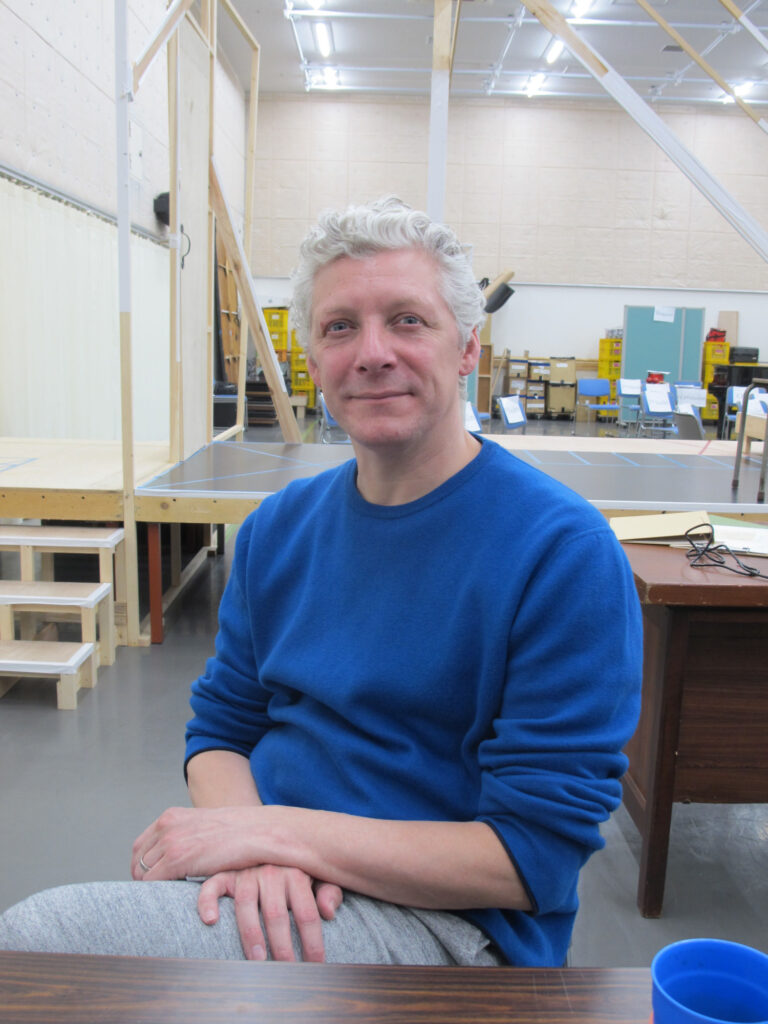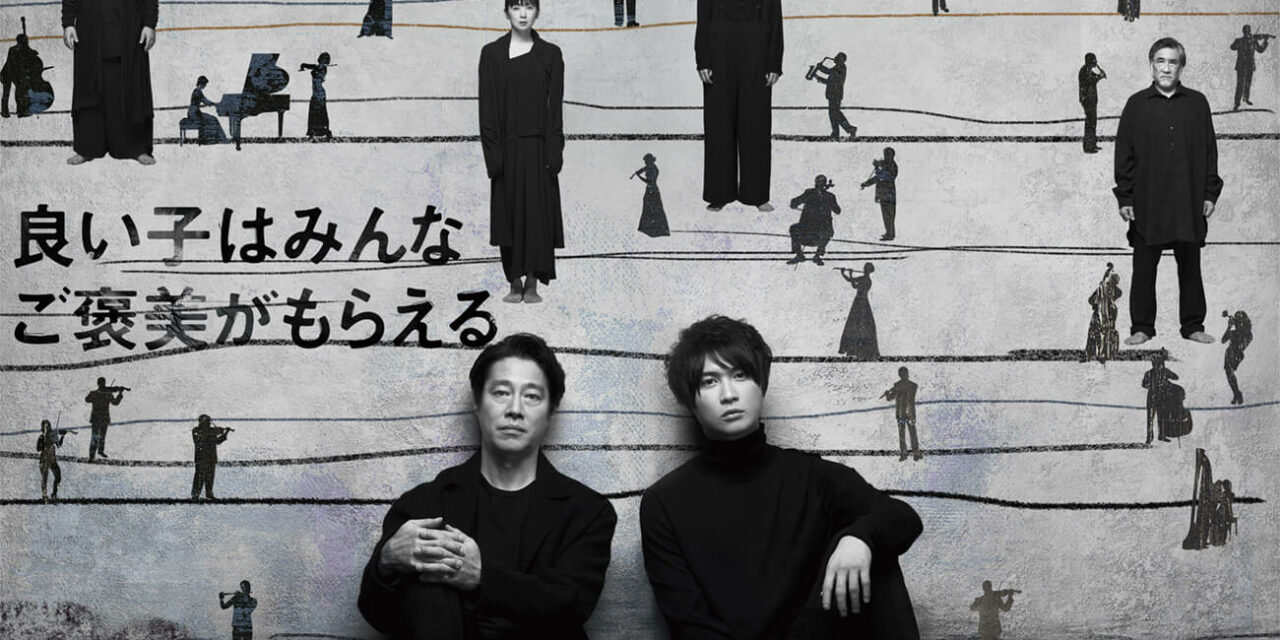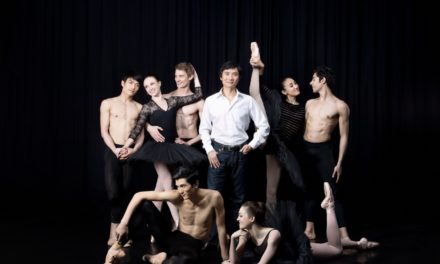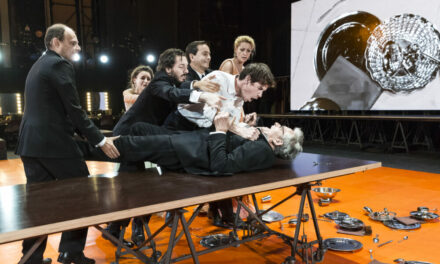Tom Stoppard is one of the most influential figures in theater today and one of the most internationally performed postwar dramatists.
Both his 1966 Tony-winning absurdist tragicomedy Rosencrantz and Guildenstern Are Dead, featuring minor characters from Shakespeare’s Hamlet, and his time- and space-spanning masterpiece Arcadia, an Olivier Award-winner in 1993, are often staged around the world, including in Japan.
However, the 81-year-old Czech-born British playwright’s Every Good Boy Deserves Favour — set for an April 20 to May 7 Tokyo run ahead of a move to Osaka — has only been seen a few times since its London premiere 42 years ago. These Japan performances will be the first outside the U.K. or U.S.
The rarity is due to the huge complexity of the work that here requires six actors, seven dancers and a full orchestra that also plays a key role in the action.
The unique nature of this piece, often referred to as EGBDF — the notes on the lines of the treble clef in sheet music — stems from its origin as a collaboration between Stoppard and the German-American pianist, composer and conductor Andre Previn (1929-2019), who conceived the idea of “a play for actors and orchestra.”
Speaking to The Japan Times, William Tuckett, the English director of the upcoming Japanese productions, says, “When I was talking with the producer of Parco Entertainment a while ago, he recommended this play. He saw the acclaimed National Theatre production in London in 2009 and said he loved how it incorporates so many elements.
“I also think it’s a curious piece of theater unlike anything else audiences will have seen,” the 50-year-old choreographer, dramatist, and former Royal Ballet soloist adds. Tuckett has enjoyed a long working relationship with Japan, including his Tsuru (The Crane Maiden), a folktale-based piece he created with local dancers and staff in 2012.
This time, though, there’s nothing folksy about EGBDF, a powerful, polemical work that originally took aim at the Soviet Union’s practice of treating regime opponents as being mentally ill. Set mainly in an asylum, its action centers around a political prisoner named Alexander Ivanov (played by leading stage actor Shinichi Tsutsumi, referred to in the play as “Alexander”) and a paranoid schizophrenic with the same name.
However, whereas the latter (played by singer Ryosuke Hashimoto, referred to as “Ivanov”) is constantly conducting an overarching orchestra in his mind (that the audience can hear), his dissident namesake faces unrelenting pressure to admit his political views are due to mental illness. In addition, Alexander’s young son Sacha (played by Korean film star Shim Eun-kyung) is forced by his teacher to denounce his father as insane.
“There is a lot of underscoring of the words by the music running underneath, which interweaves with them and creates feelings to match the drama,” Tuckett says.
“Yet though it’s clear where segments of words and music start and end, there’s no indication from Stoppard or Previn about the pacing in between. Hence we spend lots of time doing one part slower, then another part a bit more slowly, or faster, until we get the score to really support the text so they’re totally intertwined and locked together.”
For Tuckett — whose illustrious career has taken in ballet, dance, opera, musicals and theater in roles spanning dancer, choreographer, director, and actor — this challenge of handling 35 musicians under French conductor Yannick Paget, along with those six actors and seven dancers, could have been custom-made.
“I feel lucky that I am very musical,” he says. “As I read music and I’ve been a musician and a singer, I can look at the score with the orchestra and talk about the play musically. Then I can talk with the actors to be sure the score is completely locked into what’s happening on stage.”

Music maestro: Director William Tuckett says his knowledge of music has helped him in directing the Japanese production of “Every Good Boy Deserves Favour. | Photo: Nobuko Tanaka
Although this 75-minute work is often described as absurdist, Tuckett points to its growing relevance in today’s world, where power and money increasingly trump quality of life or values of right and wrong.
“It’s full of contradictions of human nature,” Tuckett points out, citing how anti-regime Alexander has to lie about himself to have any hope of returning to his family, whereas Ivanov seems harmless but actually creates an atmosphere of psychic fear.
“Despite this,” the director says, “I don’t think my job is to answer these questions; it is to present them. Stoppard doesn’t answer them, so it would be arrogant of me to do so.”
However, noting that the “free market movement” had started by the time the play was written, Tuckett points to absurdist consequences that have ensued, with capitalist efficiency and “money worship” relentlessly controlling morality and the course of people’s lives.
“What is interesting in EGBDF is that Stoppard’s homeland was a suppressed eastern European country when he moved to Britain, which was much more liberal, with an openness of thought and a high regard for education and the literary arts — and he was a very academic writer.
“Yet in this play the person not conforming is Alexander, who actually has a moral code and intellectual rigor. The emotional and instinctive person is Ivanov, who is ironically the human end of the big controlling machine. But it is really interesting how they are locked together.”
Tuckett says that, in practice, this complex interweaving involves examining the text in detail with the actors.
“In that process, though, I found out my approach is quite different from that of the Japanese actors,” he says. “I wanted to meet them halfway with them talking about their characters and roles. Then I realized how unusual that is in Japan. But I feel my job is to direct, not to dictate.”
As for how he thinks EGBDF will be received here, Tuckett says, “I hope parents will take their children and then have a debate about these two opposite characters’ life decisions and ways of being themselves.”
But he stressed he doesn’t want to present answers, and that “everything is up to each person.” After all, we’re still living in a non-dictatorial world of theater.
“Every Good Boy Deserves Favour” runs April 20 to May 7 at Akasaka Act Theater in Minato Ward, Tokyo. It then runs on May 11 and 12 at Osaka Festival Hall in Osaka. For details, visit www.parco-play.com.
This article originally appeared in TheJapanTimes on April 16, 2019, and has been reposted with permission.
This post was written by the author in their personal capacity.The opinions expressed in this article are the author’s own and do not reflect the view of The Theatre Times, their staff or collaborators.
This post was written by Nobuko Tanaka.
The views expressed here belong to the author and do not necessarily reflect our views and opinions.


















